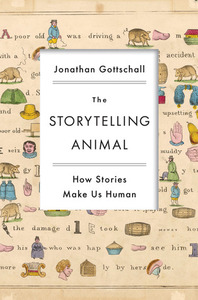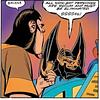Take a photo of a barcode or cover
Why are we addicted to stories.
The author does a very good job outlining the evolutionary need for stories and how they shape our everyday lives, and therefore the society we live in.
It outlines the power and presence of good stories from different points of view such as anthropology, psychology, evolutionary theory, and sociology. It is profoundly insightful and persuasive, leaving the reader analyzing their actions and how stories have molded their lives.
It's a rather interesting topic about how the brain functions and constantly revolves around stories, and how that is beneficial to readers (as long as stories don't consume them). In particular, the whole segment about how stories help in practice for real life and have real applications was my favorite.
All in all, this is a good book to persuade you to read in general, which is ironic but beautiful at the same time.
The author does a very good job outlining the evolutionary need for stories and how they shape our everyday lives, and therefore the society we live in.
It outlines the power and presence of good stories from different points of view such as anthropology, psychology, evolutionary theory, and sociology. It is profoundly insightful and persuasive, leaving the reader analyzing their actions and how stories have molded their lives.
It's a rather interesting topic about how the brain functions and constantly revolves around stories, and how that is beneficial to readers (as long as stories don't consume them). In particular, the whole segment about how stories help in practice for real life and have real applications was my favorite.
All in all, this is a good book to persuade you to read in general, which is ironic but beautiful at the same time.
یک وقتی با عزیزی در این مورد صحبت میکردیم که چرا داستان خواندن خوب و بلکه لازم است. من عمیقاً معتقد بودم که داستان خواندن در شناخت آدمی از زندگی مؤثر است اما برای این یک جمله که عقیدهام را توضیح میداد، تفسیری دیگری نداشتم. از جانتان گاتشال عمیقاً ممنونم که در این کتاب خوشخوانش این موضوع را برایم شرح داد و باعث شد از خواندن یکنفس کتابش لذت ببرم. ممنونم از آقای عباس مخبر که با ترجمهی سلیسشان در این لذت نقش مهمی را ایفا کردند
“The real threat isn’t that story will fade out of human life in the future; it’s that story will take it over completely.”
I was recommended this book by a professor in cognitive linguistics in order to read up on the topic. I’m happy to say that this is the sort of informative book that doesn’t feel like you are reading about academics even though really, you’re reading about a whole array of academic topics. Along with story, Gottschall treats subjects such as memory, gender in the classroom, neurology, and popular media. Importantly, he does so with an amazing sense of humor and youth, talking about “ink people” in novels and a “Neverland” that exists within us all and which we feed every day by telling and consuming stories.
I do have a few smaller issues with the book. Although it deserves all the praise it received about content and creativity, I do wonder if it couldn’t have been more succinct in its explanations. I’m certainly not saying the stories at the start of each chapter don’t add anything, because they do, but there’s an awful lot of repetition in places after those stories where the point has been clear for a while. This leads to chapters that have no real depth but are rather crammed with crude examples (such as Gottschall’s dream of an evil elf masturbating in a laundry room, which Freud would have a field day with).
I’m also not entirely convinced an author should be ranking wars and genocides in an informative (albeit also entertaining) book, as Gottschall does when he says the Second World War was “the worst war in history, and the worst genocide” and the American Civil War “the most terrible war in American history”. I’m by no means saying these are not the worst genocide or the most terrible war in history, but there’s something about ranking genocides that doesn’t sit well with me. Maybe it’s the countless people who died in any of them, worst or not.
Then, the book is quite western in its stories and examples, though it does mention non-western societies and tribes occasionally. Gottschall argues that all people around the world have stories entwined in their daily lives, but I would’ve liked to see some longer examples of that from non-western cultures.
That said, these small criticisms should not take away from the fact that I recommend this book to anyone hoping to learn a little more about how story is infinitely intertwined in humans’ minds. It’s also a great read if you’re just someone who needs a break from reading fiction and would rather read about fiction for a change. And anyway, who wouldn’t want to read a book by an author whom the great Steven Pinker has called “one of [his] favorite evolutionary psych writers”?
I was recommended this book by a professor in cognitive linguistics in order to read up on the topic. I’m happy to say that this is the sort of informative book that doesn’t feel like you are reading about academics even though really, you’re reading about a whole array of academic topics. Along with story, Gottschall treats subjects such as memory, gender in the classroom, neurology, and popular media. Importantly, he does so with an amazing sense of humor and youth, talking about “ink people” in novels and a “Neverland” that exists within us all and which we feed every day by telling and consuming stories.
I do have a few smaller issues with the book. Although it deserves all the praise it received about content and creativity, I do wonder if it couldn’t have been more succinct in its explanations. I’m certainly not saying the stories at the start of each chapter don’t add anything, because they do, but there’s an awful lot of repetition in places after those stories where the point has been clear for a while. This leads to chapters that have no real depth but are rather crammed with crude examples (such as Gottschall’s dream of an evil elf masturbating in a laundry room, which Freud would have a field day with).
I’m also not entirely convinced an author should be ranking wars and genocides in an informative (albeit also entertaining) book, as Gottschall does when he says the Second World War was “the worst war in history, and the worst genocide” and the American Civil War “the most terrible war in American history”. I’m by no means saying these are not the worst genocide or the most terrible war in history, but there’s something about ranking genocides that doesn’t sit well with me. Maybe it’s the countless people who died in any of them, worst or not.
Then, the book is quite western in its stories and examples, though it does mention non-western societies and tribes occasionally. Gottschall argues that all people around the world have stories entwined in their daily lives, but I would’ve liked to see some longer examples of that from non-western cultures.
That said, these small criticisms should not take away from the fact that I recommend this book to anyone hoping to learn a little more about how story is infinitely intertwined in humans’ minds. It’s also a great read if you’re just someone who needs a break from reading fiction and would rather read about fiction for a change. And anyway, who wouldn’t want to read a book by an author whom the great Steven Pinker has called “one of [his] favorite evolutionary psych writers”?
informative
medium-paced
Some very good points and interesting insights. Definitely worth the read, but more of a long essay and literature review than a full book itself (hence the 3 stars).
Blinks:
1. Our lives are full of make-believe stories that always seem to revolve around trouble.
2. With the help of stories we can practice for real life.
3. Dreams are nighttime stories that help our brains learn.
4. Our mind weaves information into meaningful stories, and sometimes it goes awry.
5. Stories shape our beliefs and behaviour.
6. Everyone likes to tell the story of their life - but that's not necessarily a true story.
7. Storytelling is changing its form - and becoming even more addictive because of this.
1. Our lives are full of make-believe stories that always seem to revolve around trouble.
2. With the help of stories we can practice for real life.
3. Dreams are nighttime stories that help our brains learn.
4. Our mind weaves information into meaningful stories, and sometimes it goes awry.
5. Stories shape our beliefs and behaviour.
6. Everyone likes to tell the story of their life - but that's not necessarily a true story.
7. Storytelling is changing its form - and becoming even more addictive because of this.
This was a quick read, meant to be an analysis of how humans instinctively tell stories, but the author never got too deep into any one aspect and instead breezed over a half dozen different variations on the theme. His somewhat dismissive comments concerning RPGs and LARPing in the final chapter were inaccurate enough to make me question the depth of scholarship in the rest of the book. I'm still happy I read it, and there are certainly some parts of it that I will be swiping for, no surprise, role playing games, but I was expecting a deeper, more scholarly work.
An interesting look into the psychology of story: its role in shaping history, its possible evolutionary roles, and where it manifests.
Could've done without the aside into gender essentialist biological determinism, and the book blithely promotes the left-brain, right-brain myth without acknowledging any of the science about neuroplasticity from the last 40 years. Odd choice.
Could've done without the aside into gender essentialist biological determinism, and the book blithely promotes the left-brain, right-brain myth without acknowledging any of the science about neuroplasticity from the last 40 years. Odd choice.
Nothing particularly revolutionary here (though he often makes it sound like he's saying something that no one has ever said before), but some interesting stuff from neuroscience makes his case stronger. Also, it's quite well-written.
The book is an easy read about stories and the history that humanity has with them.
I read this as an aside to reading about how to tell stories. As such, the book provides a nice ‘why’ while concurrently learning about the ‘how’ of storytelling.
I found myself familiar with many of the citations used in the book. It is an interesting read, but if you are a heavy reader into psychology (Thinking Fast and Slow and similar books) you may be also be familiar with the citations.
I read this as an aside to reading about how to tell stories. As such, the book provides a nice ‘why’ while concurrently learning about the ‘how’ of storytelling.
I found myself familiar with many of the citations used in the book. It is an interesting read, but if you are a heavy reader into psychology (Thinking Fast and Slow and similar books) you may be also be familiar with the citations.




